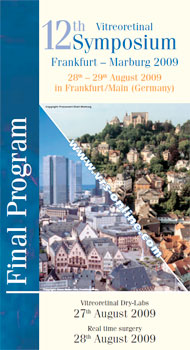12th Vitreoretinal Symposium Frankfurt – Marburg 2009
Scientific programm: Abstract
3rd scientific session: Age Related Macular Degeneration
16. What Can We Learn from Ultrastructural Investigation
of Eyes with AMD?
 Ulrich Schraermeyer (Tübingen)
Ulrich Schraermeyer (Tübingen)
In AMD eyes, small groups of photoreceptors can survive within retinal scars. The specific tissue conditions at such sites are not known but were considered by ultrastucture in this study. Donor eyes were provided by the Cleveland Eye Foundation (Ohio USA). Four eyes from donors with late wet AMD were used. The eyes were fixed in 2 % paraformaldehyde and 0.5 % glutaraldehyde in phosphate buffer after an average post-mortem time of between 10 and 12 hours. Samples with a diameter of 3 mm were selected from the middle periphery of the eye and were embedded for electron microscopy. From all eyes, specimens were used with and without osmication. The fixation protocol guarantees good structural preservation and in addition allows staining by immunohistochemistry. In specimens without osmication, the lipofuscin autofluorescence was preserved. Alternating sites in the retina with surviving and missing photoreceptors were detected close to each other. An attempt was made to find out the parameters for photoreceptor cell survival. The parameters were the thickness of Bruch´s membrane, distance of the elastic layer of Bruch´s membrane from the RPE, presence or absence of pathological or healthy choroidal capillaries and the melanin and lipofuscin pigmentation of the RPE.
The role of pathological blood vessels in photoreceptor survival is discussed.
Copyright © VRS-online, 1999-.
All rights reserved. Impressum, rechtliche Hinweise
HTML & Webdesign: SPALLEK.COM
